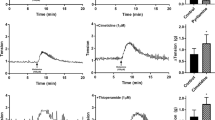Summary
The antisecretory effects of a new histamine H2-receptor antagonist, ranitidine hydrochloride, have been investigated on basal and pentagastrinstimulated acid secretion in healthy volunteers 5 and 10 h after oral administration of 150 mg. In addition, the 24-h intragastric pH-profiles have been measured in patients undergoing parenteral nutrition after three doses of 150 mg ranitidine per day.
A 40% inhibition of basal acid output has been noted even 10 h after drug intake. The intragastric pH-values were raised above 5 for at least 24h.
The new H2-antagonist ranitidine has been proven to be a potent and longacting antisecretory compound.
Similar content being viewed by others
References
Brittain RT, Daly MJ (1980) A review of the animal pharmacology of ranitidine—a new selective histamine H2-antagonist. Paper read at Drug Symposium on Ranitidine, Hamburg 14th June
Bohman T, Myren J, Larsen S (1980) Inhibition of histamine-stimulated gastric acid secretion in healthy subjects by the H2-receptor antagonist ranitidine. Scand J Gastroenterol 15:183–185
Daly MJ, Humphray JM, Stables R (1980) Inhibition of gastric acid secretion in the dog by the H2-receptor antagonists, ranitidine, cimetidine, and metiamide. Gut 21:408–412
Dammann HG, Kather H, Augustin JH, Simon B (1980) Untersuchungen über die Wirkdauer von Ranitidin. Dtsch Med Wochenschr 105:603–605
Domschke W, Lux G, Domschke S (1979) Gastric inhibitory action of H2-receptor antagonists ranitidine and cimetidine. Lancet 1:320
Kett K, Aadland E, Betstadt A (1980) Inhibition of gastric acid secretion in man with a new H2-receptor antagonist ranitidine. Scand J Gastroenterol 15:249–251
Konturek SJ, Obtulowicz W, Kwiecien N, Sito E, Mikos E, Olesky J (1980) Comparison of ranitidine and cimetidine in the inhibition of histamine-, sham-feeding-, and meal-induced gastric acid secretion in duodenal ulcer patients. Gut 21:181–186
Peden NR, Saunders JHB, Wormsley KG (1979) Inhibition of pentagastrin-stimulated and nocturnal gastric acid secretion by ranitidine. Lancet 1:690–692
Simon B, Kather H (1979) Hemmung der pentagastrin-stimulierten Magensekretion durch Ranitidin. Dtsch Med Wochenschr 104:1676–1678
Walt RP, Male PJ, Rawlings J, Tovrie P, Hunt RH, Misiewicz JJ, Milton-Thompson GJ (1979) 24-h intragastric acidity in duodenal ulcer patients on a new twice-daily H2-receptor antagonist. Gut 20:A 904
Author information
Authors and Affiliations
Rights and permissions
About this article
Cite this article
Dammann, H.G., Müller, P., Kather, H. et al. The new histamine H2-receptor antagonist ranitidine. Res. Exp. Med. 178, 151–154 (1981). https://doi.org/10.1007/BF01851489
Received:
Accepted:
Issue Date:
DOI: https://doi.org/10.1007/BF01851489




